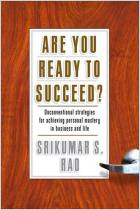Melden Sie sich bei getAbstract an, um die Zusammenfassung zu erhalten.

Melden Sie sich bei getAbstract an, um die Zusammenfassung zu erhalten.
Dr. Richard Shoup
Take Control of Your Life
How to Control Fate, Luck, Chaos, Karma and Life's Other Unruly Forces
McGraw-Hill, 2000
Was ist drin?
Forget chaos, luck, and karma, you can control your life with planning and effort (not that good luck wouldn’t help).
Recommendation
For most of this book, Dr. Richard Shoup explains the mysterious forces that cause people to believe that they don’t control their own lives. He defines chaos, luck, and karma, and gives readers strategies they can use to exert control over these life forces. These descriptions are interesting, but the most useful section is the seven-step action plan for taking control of your life at the back of the book. This simple guide is useful for anyone making a significant life change, from losing weight to taking up a new career. Shoup cites many examples and clearly believes anyone can change. He is upbeat but realistic about the challenges that change presents. The book offers a process, not a “quick fix,” but if you or someone close to you is on the cusp of a serious change or needs encouragement to take control, getAbstract recommends this book to you.
Summary
About the Author
Dr. Richard Shoup is a psychotherapist and a Presbyterian minister. He is an authority on bringing a new perspective to career transitions, human relationships, and life changes. He is cofounder of the Vocare Group, which offers seminars on career transformation using spiritual and psychological tools.


















Comment on this summary